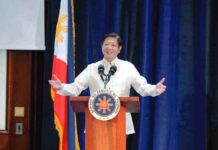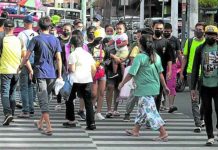[av_one_full first min_height=” vertical_alignment=” space=” custom_margin=” margin=’0px’ padding=’0px’ border=” border_color=” radius=’0px’ background_color=” src=” background_position=’top left’ background_repeat=’no-repeat’ animation=”]
[av_heading heading=’LEONEN. The events in Marawi City cannot be equated to rebellion. | SC: Maute group’s plan makes martial law valid’ tag=’h3′ style=’blockquote modern-quote’ size=” subheading_active=’subheading_below’ subheading_size=’15’ padding=’10’ color=” custom_font=”]
BY ADRIAN STEWART CO
[/av_heading]
[av_textblock size=” font_color=” color=”]
Friday, July 7, 2017
[/av_textblock]
[av_textblock size=” font_color=” color=”]
MANILA – The plan of the Islamic State-linked Maute terrorist group to remove portions of Mindanao from “allegiance to the Philippine government” makes the martial law in Mindanao valid.
This was written in the 82-page Supreme Court decision, penned by Associate Justice Mariano Del Castillo, upholding President Rodrigo Duterte’s proclamation.
Ten other justices concurred: Presbitero Velasco Jr., Teresita de Castro, Diosdado Peralta, Lucas Bersamin, Jose Mendoza, Estela Perlas-Bernabe, Francis Jardeleza, Samuel Martires, Noel Tijam, and Bienvenido Reyes.
Chief Justice Maria Lourdes Sereno and associate justices Antonio Carpio and Benjamin Caguioa had reservations on the territorial coverage of the military rule. Associate Justice Marvic Leonen was the lone dissenter.
“A review of the aforesaid facts similarly leads the Court to conclude that the President, in issuing Proclamation No. 216, had sufficient factual bases tending to show that actual rebellion exists,” wrote the decision.
“The President’s conclusion that there was an armed public uprising was reached after a tactical consideration of the facts,” it added. “In fact, the President satisfactorily discharged his burden of proof.”
Sereno and Caguioa wanted the martial law to be limited to Marawi City, Lanao del Sur and Maguindanao, while Carpio wanted it to just be in Marawi.
‘MAUTE NOT REBELS’
A martial law in the entire Mindanao is not necessary since the enemies of the state — the Maute group — were terrorists and not rebels, Leonen said.
“With due respect to my colleagues, I cannot join them in their acceptance of the President’s categorization of the events in Marawi as equivalent to the rebellion mentioned in Article VII, Section 18 (of the Constitution),” Leonen said.
“In conscience, I do not see the situation as providing for the kind of necessity for the imposition of martial law in Marawi, as well as throughout the entire Philippines,” he added.
Moreover, “the events in Marawi amounted to acts of terrorism, which should be addressed in a decisive but more precise manner,” said Leonen. “The military can quell the violence. It can disrupt many of the planned atrocities that may yet to come.”
The atrocities of the Maute group in Marawi were “designed to slow down the advance of government forces and facilitate their escape and are not designed to actually control seats of governance,” he said.
The decision stemmed from three consolidated petitions seeking to nullify the martial law. The petitioners asserted that Duterte had no factual basis for the proclamation and that the Armed Forces did not recommend martial rule./PN
***
[/av_textblock]
[/av_one_full]



